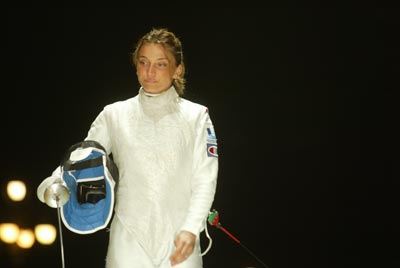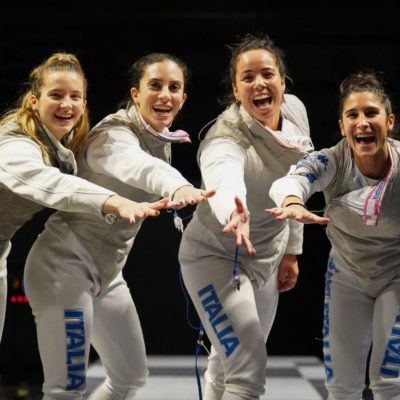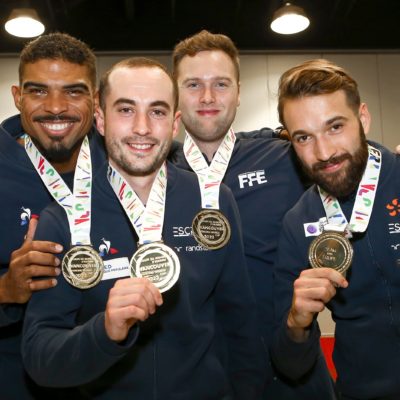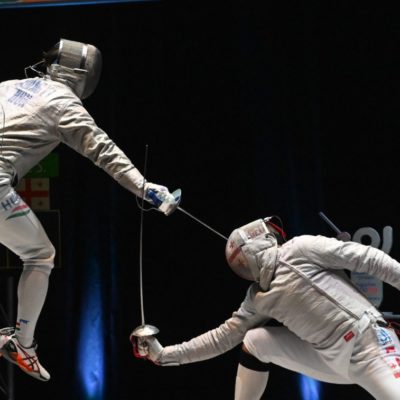 Margherita Granbassi is the reigning World Champion in Women’s Foil and is a member of the Italian national team.
Margherita Granbassi is the reigning World Champion in Women’s Foil and is a member of the Italian national team.
She spoke with Serge Timacheff for an interview after her bronze medal performance at the 2007 Las Vegas Women’s Foil World Cup. Listen to the interview and find out the one woman she does not want to have to fence at the 2007 World Championship in St. Petersburg.
{audio}https://fencing.net/podcast/Granbassi_Las_Vegas.mp3{/audio}
Transcript:
Interviewer: This is Serge Timachev in Las Vegas, and I’m here with Margherita Granbassi. First, congratulations on your bronze medal last night here at the Grand Prix.
M. Granbassi: Thank you very much. It’s a first time for me to [get medal in] Las Vegas I thought was not a very lucky competition for me, but now I change my idea.
Interviewer: Have you been to the Grand Prix here before?
M. Granbassi: Yes, it’s the third time here, and maybe next year we will come back.
Interviewer: And how is the season for you this year?
M. Granbassi: My season started not so well. I make only one final in the first competition in Zalsburg, and then I make not very good competition, but after in Asia in Seoul, I won my first competition this year, and it was a Grand Prix competition, the first one for the Olympic qualification, and so I was very happy, and then a third place in Shangai, and here in Las Vegas.
Interviewer: Last year, obviously, when you won the World Championships that was a good moment.
M. Granbassi: It was the best moment of my life maybe.
Interviewer: And I think it puts you in a new position with more psychological momentum to go on and win more. Is that true?
M. Granbassi: I don’t know. When I won, I was really curious to see how I will do this season, the next competition, but I’m the same person as before, and I know I have to compete before with me and with my – with the confidence on myself, and then with my – I don’t know. How do you say the person who fence with you is your visitor – no. How do you say? The opponent, yes.
Interviewer: And what are you doing these days for training? Give me an example of your typical training week?
M. Granbassi: Yes.
Interviewer: If there is a typical week.
M. Granbassi: Yes, there is a typical week when fencing is like a job for me, and so I make a thing all days and one day is yes and one day is no. So, I take days, and we make athletic preparation and then technical training in Barcelona, and I prefer to make – to run and to make athletical preparation in the morning.
Interviewer: How do you analyze your own performance?
M. Granbassi: It’s difficult. (Laughter) I analyze it with my coach especially, and we try to find the solution for the next time, but it’s not always you can find it.
Interviewer: What is it that you’re working on the most right now? What is the biggest challenge for you personally in your fencing to achieve right now? What is it?
M. Granbassi: I don’t understand you.
Interviewer: What are you trying to do in your training? What’s your next level? Is there something you’re trying to work on to make better?
M. Granbassi: Yes – yes, sure. After World Championship, I had a lot – I want to start very soon the training camp with national team, and win it’s so fun, and so when you try one time, you want to try other times, but doesn’t matter if the gold medal will not arrive. I try to make my best.
Interviewer: And specifically in Foil, tactically, what things are you working on the most?
M. Granbassi: I have to work a lot with my mind, ‘cause I’m not really – I have not a big confidence in myself, and so this is one of my biggest problems.
Interviewer: And how do you work on that?
M. Granbassi: We have phychologists, who work with that in the training camp, and when I need his help, I go to him, and he is also really friend of mine.
Interviewer: And what does he do to help you? How does that work?
M. Granbassi: (Laughter)
Interviewer: If you can describe it.
M. Granbassi: Yes, it’s a little bit difficult to describe it. We make some exercises to concentrate, to learn to concentrate before a match or during the competition, and also to become more confidential.
Interviewer: One thing I’ve noticed with you is you are very calm on the strip. You may not be calm inside, but you appear to be calm. How do you manage to be so calm and to ignore it when you have 5000 screaming Italian children, you know, in the stands? How do you manage to be so calm?
M. Granbassi: Well, I am calm when I sense really good, ‘cause sometimes I’m very nervous, and sometimes I’m very angry. My coach call me the bull, because I make attacks without thinking, and so it depends from the moment.
Interviewer: How are you finding video refereeing? Is that good, or bad, or a mix?
M. Granbassi: I like it. I like that fencer is going to make some new technologies as the wireless and also the video, ‘cause it’s one more possibility if you don’t agree with the judge’s decision, but maybe it’s not sure that they will give you the touch.
Interviewer: And is wireless Foil working well; do you think?
M. Granbassi: Yes, I think, yes. I think that maybe they have to work a little bit more, but I really like if in fencing we will have some new technologies.
Interviewer: We’ve seen some problems, I guess, or I’ve heard some people say that some of the – in wireless Foil, sometimes the off target doesn’t register correctly. Have you seen that?
M. Granbassi: Yes, maybe it depends on your foil maybe. I think this is the problem you have to always feel foil perfect, and so it’s good to have it with the team one armor, one person who checks your foil after every match.
Interviewer: How many Women’s Foilists will the Italians send to St. Petersburg?
M. Granbassi: For the Women Foil, four.
Interviewer: Just the standard.
M. Granbassi: Four individual and then the team.
Interviewer: And who are they at this point; do you know?
M. Granbassi: Yes, in Italy we make already the teams, so we have the European Championship next week. We’re come back to home and after three days we fly to Belgium, ‘cause we have this important competition, and the team will be me, Ilaria Salvatori, the girl who won yesterday, and Trillini, and Vezzali, also for St. Petersburg.
Interviewer: I have a question about team competition. When you have a team competition, obviously the strategy as to how you compete in team is different from individual, and sometimes, you know, you have to decide who you put in as the anchor, or who you put in as an alternate. Do you have – who manages that? Is that Andrea Megrow? Does he decide depending on who you’re fencing?
M. Granbassi: Yes, he decide. He knows very well the team we have to fence against, and so maybe he said, “Okay. Margherita is better to fence with France, and Ilaria with Japan.” And so we could change. We know we have four good fencers, and so we can change when we need it, and I really like team competition, ‘cause it’s strange. ‘Cause we are a – the day before we are one against the others, and the day after we are a really united team and in this period is important, ‘cause have the Olympic qualification by the team, and so I like this.
Interviewer: How do you feel about fencing in China?
M. Granbassi: (Laughter) I don’t know. I don’t want to think about it. We will go only in three, and so all the Italians are good, and we have a lot of confidence.
Interviewer: And so tell me, let’s say that you make the finals in St. Petersburg, who is the person you absolutely would not want to have as your opponent?
M. Granbassi: Valentina, (Laughter) ‘cause always when she lose against one girl, I saw that the time after she is like a killer. So, it’s better to don’t fence with her. (Laughter)
Interviewer: Well, thank you for your time, and good luck with the season.
M. Granbassi: Thank you very much.
[End of Audio]
{mxc}





